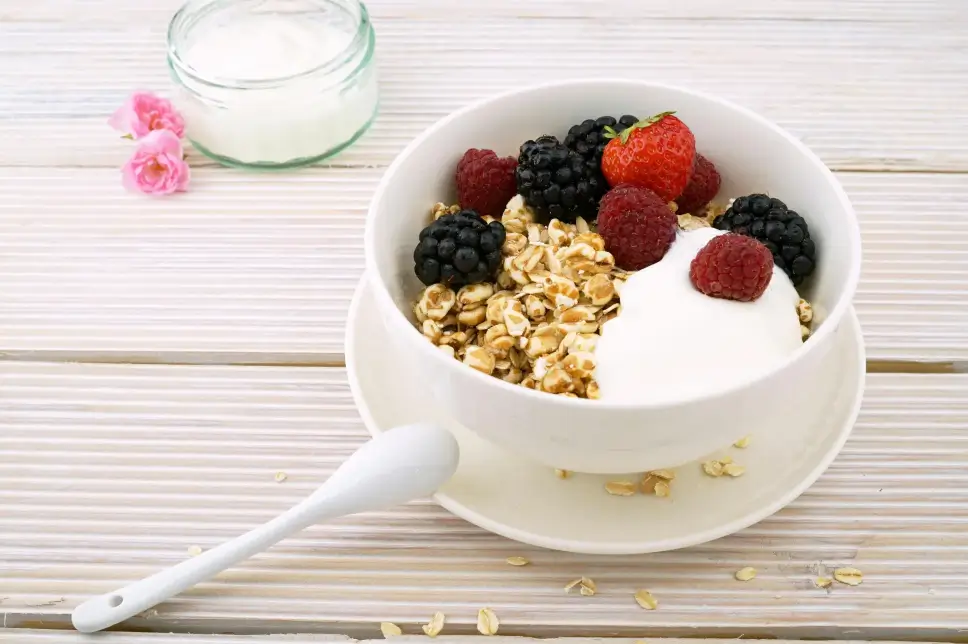
Finally! The Anti Inflammatory Diet That Actually Works (See Results in 7 Days!)
An anti-inflammatory diet focuses on foods that help reduce inflammation and promote overall health. Chronic inflammation is linked to various diseases, including heart disease, diabetes, arthritis, and certain cancers. By choosing nutrient-dense foods that support the body’s natural healing process, you can lower chronic inflammation and improve overall well-being.
Guide to Food for an Anti-Inflammatory Diet:
- Fruits and Vegetables
Packed with antioxidants, vitamins, and fiber, these foods are essential in reducing inflammation. Colorful options like berries, leafy greens (spinach, kale, swiss chard), broccoli, cauliflower, and sweet potatoes are some great choices. - Whole Grains
Whole grains like brown rice, quinoa, oats, and barley are rich in fiber, which helps regulate blood sugar and reduce inflammation. Opt for these over refined carbs to maximize health benefits. - Healthy Fats
Healthy fats from sources rich in omega-3 fatty acids help reduce inflammation. Fatty fish like salmon, walnuts, chia seeds, flaxseeds, olive oil, and avocados are all fantastic additions. - Lean Protein
Protein sources that are less likely to promote inflammation include skinless poultry, legumes (beans, lentils, chickpeas), tofu, and tempeh. - Nuts and Seeds
Nuts and seeds provide healthy fats, protein, and antioxidants, all of which help fight inflammation. Consider almonds, walnuts, pumpkin seeds, and sunflower seeds. - Herbs and Spices
Turmeric (curcumin), ginger, garlic, cinnamon, and rosemary are known for their powerful anti-inflammatory properties. - Green Tea
Green tea contains polyphenols, antioxidants that help reduce inflammation in the body. - Legumes and Beans
Lentils, chickpeas, black beans, and kidney beans are rich in fiber, protein, and essential vitamins that can help reduce inflammation. - Probiotic-Rich Foods
Fermented foods like yogurt with live cultures, kimchi, sauerkraut, and kefir support gut health, which is linked to inflammation regulation.
7-Day Anti-Inflammatory Diet Plan:
This 7-day anti-inflammatory diet plan focuses on incorporating anti-inflammatory foods while eliminating those that promote inflammation, such as processed sugars, refined carbs, and trans fats.
Day 1: Focus on Omega-3s and Fiber
- Breakfast: Oatmeal with chia seeds, flaxseeds, and blueberries.
- Lunch: Grilled salmon with a mixed green salad (spinach, kale, tomatoes) and olive oil dressing.
- Snack: Almonds and green tea.
- Dinner: Quinoa and vegetable stir-fry with broccoli, bell peppers, and tofu.
Day 2: Emphasize Antioxidants
- Breakfast: Smoothie with spinach, banana, strawberries, and unsweetened almond milk.
- Lunch: Lentil soup with turmeric, garlic, and ginger.
- Snack: Carrot sticks with hummus.
- Dinner: Grilled chicken with roasted sweet potatoes and a side of steamed green beans.
Day 3: Include Healthy Fats
- Breakfast: Avocado toast on whole-grain bread, sprinkled with chia seeds.
- Lunch: Chickpea salad with cucumber, tomatoes, olive oil, lemon, and parsley.
- Snack: Walnuts and a small piece of dark chocolate (70% cocoa or higher).
- Dinner: Baked mackerel with quinoa and sautéed spinach with garlic.
Day 4: Gut-Boosting Day
- Breakfast: Greek yogurt with chia seeds, flaxseeds, and fresh berries.
- Lunch: Roasted vegetable salad (carrots, zucchini, bell peppers) with tahini dressing.
- Snack: Apple slices with almond butter.
- Dinner: Stir-fried tofu with broccoli, cabbage, and turmeric, served over brown rice.
Day 5: Focus on Lean Proteins
- Breakfast: Scrambled eggs with spinach and turmeric.
- Lunch: Grilled turkey breast with a side of quinoa and roasted Brussels sprouts.
- Snack: Green tea with a handful of sunflower seeds.
- Dinner: Baked cod with a side of sautéed kale and roasted butternut squash.
Day 6: Fresh and Fiber-Rich
- Breakfast: Chia pudding made with coconut milk, topped with mixed berries.
- Lunch: Whole grain wrap with grilled vegetables (eggplant, zucchini, mushrooms) and hummus.
- Snack: Sliced cucumber with a squeeze of lemon juice and sea salt.
- Dinner: Stir-fried shrimp with broccoli, bell peppers, and a drizzle of olive oil.
Day 7: Relax with a Balanced Meal
- Breakfast: Smoothie bowl with mixed berries, spinach, and a sprinkle of flaxseeds.
- Lunch: Quinoa salad with roasted beets, avocado, and a lemon-olive oil dressing.
- Snack: Carrot and celery sticks with guacamole.
- Dinner: Grilled chicken with steamed asparagus and a side of brown rice.
Tips for Success:
- Hydration: Drink plenty of water throughout the day. Green tea and herbal teas are also great anti-inflammatory beverages.
- Herbs and Spices: Use turmeric, ginger, garlic, and cinnamon to boost flavor and inflammation-reducing properties in meals.
- Portion Control: Aim for balanced portions of protein, healthy fats, and fiber-rich foods to maintain energy and keep blood sugar stable.
Does an Anti-Inflammatory Diet Work in 7 Days?
While a 7-day anti-inflammatory diet can begin to show some positive effects, the full benefits of reducing inflammation typically take longer to manifest.
What You Might Feel in 7 Days:
- Increased Energy: You might notice feeling more energized as your body adjusts to nutrient-dense foods that support metabolic health and reduce oxidative stress.
- Improved Digestion: With fiber-rich foods and probiotics (like yogurt), you could experience less bloating and better gut health, which can positively impact inflammation levels.
- Reduced Swelling: If you have joint pain or bloating due to inflammation, the anti-inflammatory foods (like turmeric, ginger, and omega-3 fatty acids) can start to alleviate discomfort, though significant changes might take a little longer.
- Better Mood: Foods rich in antioxidants and omega-3s (like leafy greens, berries, and fatty fish) support brain health, potentially helping to stabilize mood and reduce feelings of stress or irritability.
- Improved Skin: If inflammation is contributing to skin issues like acne or eczema, you may notice slight improvements in complexion as the skin begins to calm down.
Long-Term Benefits (1-3 Months and Beyond):
- Chronic Inflammation Reduction: Significant reductions in chronic inflammation and the related risk for conditions like heart disease, diabetes, and arthritis generally take a few weeks to months.
- Sustained Weight Management: The anti-inflammatory diet can support healthy weight loss by stabilizing blood sugar and improving metabolism, but more noticeable weight changes may take longer than 7 days.
- Long-Term Joint Health: Continued reduction in joint pain and stiffness from conditions like arthritis typically improves over several weeks or months as inflammation decreases.
- Cognitive and Mental Health: Anti-inflammatory diets may help improve mental clarity, reduce anxiety, and promote long-term brain health over time.
While 7 days of an anti-inflammatory diet is a great starting point, lasting benefits like significant inflammation reduction, weight management, and chronic disease prevention require longer-term commitment. Use the 7-day period as a jumpstart and continue the diet over weeks and months for maximum impact. This dietary shift can significantly enhance your health—starting today.
FAQs
Yes, you can still follow an anti-inflammatory diet by choosing alternative foods that suit your needs. For example, if you're allergic to nuts, you can replace them with seeds or other healthy fats like avocado or olive oil.
While an anti-inflammatory diet provides most of the nutrients your body needs, some people may benefit from supplements like omega-3 fatty acids, turmeric, or vitamin D. It’s always a good idea to consult with a healthcare provider to determine if supplements are right for you.
Staying motivated can be easier when you focus on the positive changes you notice, like better energy, improved digestion, or clearer skin. Setting small, achievable goals and celebrating those wins can keep you on track. Additionally, experimenting with new recipes and finding foods you enjoy can make the diet feel less restrictive and more enjoyable.
Sleep is crucial for reducing inflammation in the body. A diet rich in anti-inflammatory foods can promote better sleep by supporting metabolic and hormonal balance, but it’s also important to get enough restful sleep for optimal immune function and to reduce chronic inflammation effectively.
It can be, but older adults should ensure they maintain muscle mass, get enough nutrients, and consult a doctor before starting.

Sonakshi Kandhari





